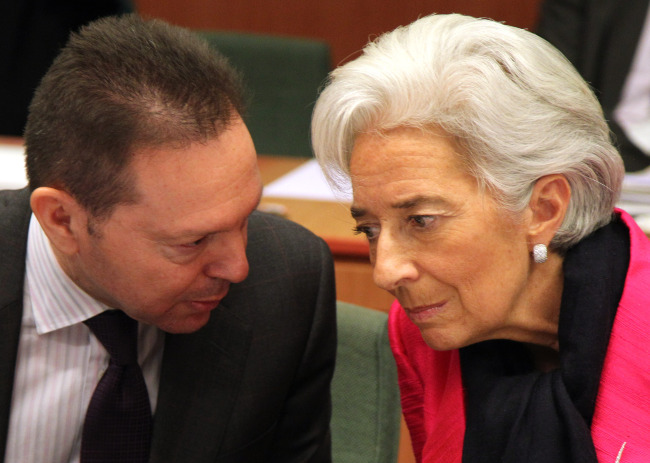BRUSSELS (AP) ― Greece’s international creditors failed to agree Monday on how to get the country’s bailout program back on track and put off again the release of the next batch of loans that Athens is using to pay its day-to-day bills.
However, European finance ministers meeting in Brussels did decide to give Greece two more years until 2016 to reform its economy ― one of the conditions of its bailout package. But they could not agree on how to pay for the extension or when the country’s debts would reach a manageable level.
“Today a huge step has been made in order to secure the program on Greece, in order to enhance the confidence on the eurozone, in order to find a strong and definite solution for this question, which has lasted for more than two years now,” said French Finance Minister Pierre Moscovici, as he left the meeting of finance ministers from the 17 countries that use the euro. “We couldn’t do more today.”
The European Central Bank, the International Monetary Fund and the European Commission, which is the EU’s executive arm, have twice agreed to bail out Greece, pledging a total of 240 billion euros in rescue loans. The country has received about 150 billion euros of those loans so far, in exchange for making tough budget cuts and sweeping reforms to its labor market and bureaucracy.
 |
International Monetary Fund managing director Christine Lagarde (right) talks with Greek Finance Minister Yannis Stournaras, during the Eurogroup finance ministers meeting in Brussels on Monday. (AP-Yonhap News) |
The main aim of the bailout program is to right Greece’s economy and get it to a point where it no longer relies on international aid and can independently raise money on the debt markets. The bailout program was supposed to steadily reduce Greece’s debt until, in 2020, it reached 120 percent of its annual gross domestic product ― a level generally considered sustainable. But it’s been clear for months now that the country is way off track from achieving that goal ― although how far off track is a point of contention among its lenders.
As IMF chief Christine Lagarde left the meeting, she insisted that Greece should still be aiming to bring its debts to the 120 percent level by the original target of 2020. But Jean-Claude Juncker, who chairs the meetings of the eurozone finance ministers said that the deadline would likely be changed to 2022.
“What matters at the end of the day is the sustainability of the Greek debt, so that country can be back on its feet and re-access the private market in due course,” Lagarde said.
The question of debt sustainability is as important as it is divisive: If Greece’s debts can’t be reduced to a level where the country can pay them down, then the billions of euros in bailout loans given to Greece will have been wasted.
It’s taken on even more importance in recent weeks because Germany has insisted that until the question is resolved, Greece can’t receive its next 31.5 billion euros ($40 billion) batch of its bailout loans. The country has a bond payment coming due this week, but EU Finance Commissioner Olli Rehn said Athens would be able to roll it over and didn’t need the loan installment.
The issue appears to have ultimately derailed Monday’s meeting, and so the ministers will meet again Nov. 20 in order to release the next batch of bailout loans.
Still, politicians sought to spin the meeting as having made some progress, especially after Greece pushed two tough bills through its parliament in recent days ― one with a raft of reforms, the other with a stringent 2013 budget.
“Words have been backed by deeds,” Rehn said after the meeting, as he also sought to underscore how many sacrifices Greece has made.
“As regards structural reforms, it is time to debunk the perception that no progress has been made. This perception is damaging, it is unfair, and it is simply wrong,” he said.
But Greece has struggled to keep up with the demanding pace of reforms set out in its rescue package and has asked its creditors for more time― hoping that a slower pace will release the stranglehold the cuts have on the economy. The country is heading into the sixth year of a deep recession, with more than a quarter of Greeks unemployed.
The ministers agreed to relax the pace, extending the timeline from 2014 to 2016, although they declined to answer the more important question of how that extra time will be paid for. The extension still needs formal approval.
Ahead of Monday’s meeting of the 17 eurozone finance ministers in Brussels, Irish Finance Minister Michael Noonan said the extension would mean 31 billion euros to 32 billion euros ($39 billion-$41 billion) in extra financing. A draft report from Greece’s creditors that was obtained by The Associated Press is short on such details.
“Since you are excluded from markets, the extension means more financing, so somebody has to pay, so you cannot ask for unlimited time period,” said Greek Finance Minister Yannis Stournaras. “I mean, it would be obviously better to be four-year extension, or a six-year extension even better, but it’s not realistic.”
Even if next week’s eurogroup meeting makes a decision on giving Greece the 31.5 billion euros loan, it will likely still need to be approved by some eurozone parliaments.








